Juan Carlos al Spaniei
|
Exista oameni de stat al caror destin este o sursa de inspiratie, de încredere si de mandrie, chiar daca nu îi întalnesti niciodata. Dar daca ai sansa de a-i întalni, atunci povestea vietii si tot ce au facut ei pentru tara lor nu te mai parasesc niciodata, ramanand undeva, la granita dintre suflet si constiinta. Principesa Margareta il cunoaste pe Regele Spaniei de mult, de cand era copil. Eu l-am intalnit doar in ultimii doisprezece ani ai vietii. Amandoi il consideram un model, un om de stat de cea mai inalta calitate. Un lider care a facut bine Europei si lumii transatlantice, nu numai Spaniei si spaniolilor. Un lider care a facut bine democratiei si care continua sa fie un model.
Exista carti a caror lectura îti marcheaza o parte sau chiar întreaga viata. Asa a fost, pentru Principesa Margareta si pentru mine, volumul “Juan Carlos, regele care s-a facut singur” de Charles Powell, profesor la Oxford si biograf al regelui Spaniei, o biografie exceptional scrisa. Imi aduc bine aminte momentul, fiindca el a insemnat mult pentru noi. Eram amandoi la San Francisco, in noiembrie 2000, alaturi de Regele Mihai si de Regina Ana. Am gasit volumul intamplator, la un stand de carte instalat temporar, intr-un hotel. Dupa lectura lui nimic nu a mai fost la fel, pentru Principesa Margareta si pentru mine, in ceea ce priveste intelesul regalitatii, al destinului Familiei noastre, al mersului Romaniei.
Am urmarit întotdeauna cu mandrie, admiratie, afectiune si încredere drumul Regelui Juan Carlos I, asa cum a facut-o oricine care îi cunoaste povestea. Dar, în ultimul timp, de cand noi însine luam parte nemijlocita la procesul de modernizare a tarii noastre, de reconciliere cu trecutul si de conectare a ei la lumea europeana si euroatlantica, de cand suntem in mijlocul valtorii vietii publice din Romania, modelul de democratie spaniol si lupta Regelui Spaniei, din 1975 pana astazi, de a-si duce tara pe drumul prosperitatii, democratiei, în sanul familiei euroatlantice a natiunilor, sunt cu mult mai pregnante si cu mult mai multe întelesuri pentru noi.
De aceea, suntem încredintati ca experienta Majestatii Sale trebuie cunoscuta de romanii de astazi mai ales acum, cand stam alaturi de fratii nostri întru latinitate, spaniolii, în familia continentului european. Reîntregirea Europei este un act istoric, geografic si cultural. Ea este o nevoie identitara, o chestiune de destin, nu un obiectiv politic. Ea se face de la om la om, de la sat la sat, de la oras la oras, de la regiune la regiune, de la profesie la profesie si, iata, de la carte la carte. Dar si de la lider la lider. In 1997 si 2002, am fost musafirii Suveranilor spanioli la Madrid, in cadrul vizitelor NATO ale Regelui Mihai, care au lasat o urma de nesters in mintea si sufletul celor care l-au intalnit atunci.
Romanii stiu ca nimeni altii sa fie ospitalieri si sa se bucure din adancul sufletului de prezenta musafirilor lor. În anul 2003, Suveranii spanioli au vizitat Romania, iar tarile noastre au cunoscut, prin aceasta vizita de Stat, un moment inspirat si important.
Principesa si cu mine am stat mereu alaturi de Regele Mihai, care este un model fundamental de lider, de om de stat. Regele Juan Carlos este complet diferit, ca temperament si destin. Cunoasterea povestii sale nu a facut decat sa ne imbogateasca. Exemplul lui, asijderea. El este nu numai o sursa de inspiratie, dar si un nepretuit ajutor. De multe ori, o vorba a lui ne-a ajutat enorm, atat efectiv, cat si psihologic sau afectiv.
Astazi, 5 ianuarie, Majestatea Sa Regele spaniolilor implineste 70 de ani. Timpul trece atat de repede si este atat de neiertator! Chiar si cu Regii lumii. In 1975, aparitia Regelui Juan Carlos a salvat Spania si i-a dat o directie istorica, pe care astazi se bazeaza dezvoltarea fara precedent a tarii. In 1981, un singur om a facut fata unei situatii de neimaginat intr-o tara vest-europeana, dejucand o lovitura de stat militara. Imi aduc aminte, din unele pagini ale vremii, ca tanarul Rege Juan Carlos a cerut fiului sau de numai 13 ani sa-i stea alaturi, toata noaptea, pentru a-si aduce aminte de fiecare minut al evenimentelor tragice din 23 februarie 1981. De atunci, Spania a intrat in NATO, apoi in Uniunea Europeana. Astazi este una dintre cele mai puternice tari europene, cu un ritm ametitor de dezvoltare economica si cu mari performante in accesarea fondurilor UE. Juan Carlos al Spaniei este un mare prieten al Romaniei si unul dintre cei mai indragiti si mai admirati veri ai Familiei noastre. El este un om generos, care niciodata nu a uitat de zilele noastre de nastere sau casatorie, de orice eveniment, vesel sau trist, din familie. El ne-a ajutat atunci cand putina lume o facea. Cuvintele sale de incurajare pe care mi le-a adresat atunci, in vara lui 2003, in sufrageria mica a Palatului Elisabeta, nu le voi uita niciodata. Sunt convins ca multi romani ii vor ura astazi, in sufletele lor, la multi ani Regelui Spaniei. |

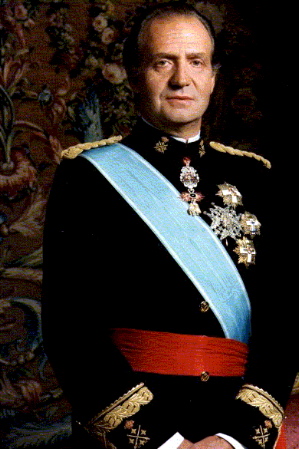
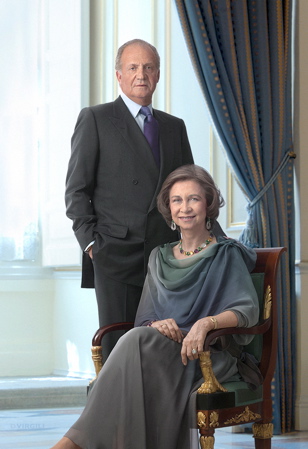
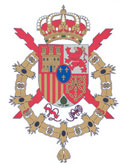
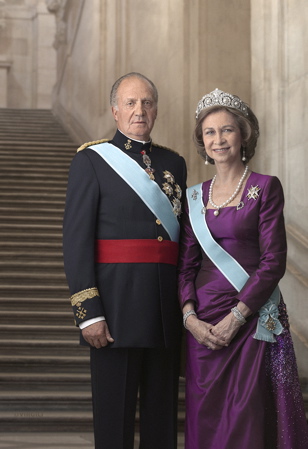
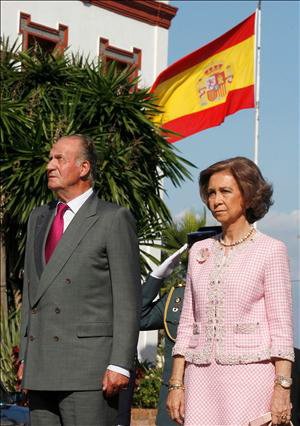
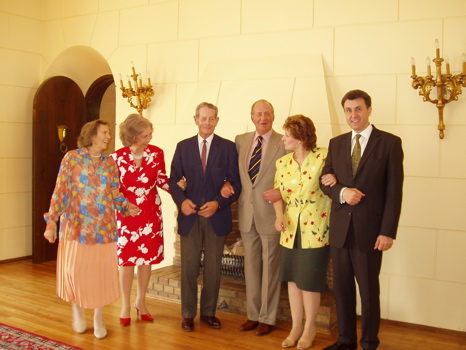
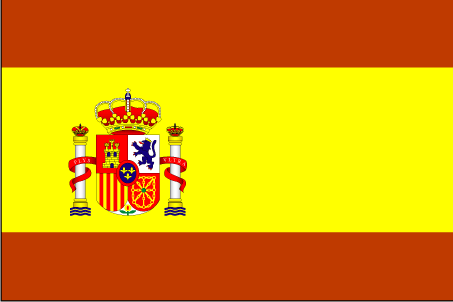




His Majesty the King was born on 5 January 1938 in Rome where the Royal Family was living, having had to leave Spain when the Republic was proclaimed in 1931. His parents were Juan de Borbon y Battenberg, Count of Barcelona and Head of the Spanish Royal Household since his father, King Alfonso XIII, relinquished this status, and Maria de las Mercedes de Borbon y Orleans.
At the express wish of his father, he was educated in Spain as from the age of ten, after a period as a boarder at the Marianist school in the Swiss town of Fribourg. His parents, meanwhile, had been living since 1946 in the coastal town of Estoril in Portugal.
His education
In 1954 he completed his secondary education at San Isidro School in Madrid and then went on to study at the Military Academies and Colleges of the Army, the Navy and the Air Force reaching the rank of Officer. During that period, he went to sea as a midshipman on the “Juan Sebastian Elcano” training ship, and also qualified as a military pilot. He completed his education from 1960 to 1961 at the Complutense University, Madrid, where he studied constitutional and international law, economics and taxation.
On 14 May 1962, in Athens, he married HRH Princess Sofia of Greece, the eldest daughter of King Paul I and Queen Federica. After their honeymoon, the Prince and Princess went to live at La Zarzuela Palace just outside Madrid which is still their residence today. Their first daughter, HRH the Infanta Elena, was born in 1963, followed two years later by HRH the Infanta Cristina and in 1968 by HRH Prince Felipe.
After his designation as successor to the Head of State in 1969, he embarked on a series of official activities, touring Spain and visiting many foreign countries.
King of all Spaniards
After the death of the Head of State, Francisco Franco, Juan Carlos was proclaimed King on 22 November 1975. In his first message to the nation in the Spanish Parliament, he expressed the basic ideas of his reign – to restore democracy and to become the King of all Spaniards, without exception.
The transition to democracy, under the guidance of a new Government, began with the 1976 Law for Political Reform. In May 1977, the Count of Barcelona transferred to the King his dynastic rights and his position as Head of the Spanish Royal Household in a ceremony which confirmed the role of the Crown in the restoration of democracy. A month later, the first democratic elections since 1936 were held, and the new Parliament drew up the text of the current Spanish Constitution which was approved by referendum on 6 December 1978 and received the royal assent in a solemn session of the Parliament on 27 December of the same year.
The Constitution establishes the political form of the State as a parliamentary monarchy in which the King is the arbiter and overseer of the proper working of the institutions. In his message to Parliament, King Juan Carlos expressly proclaimed his firm intention to abide by it and serve it. In fact it was the Monarch who saved the Constitution and democracy during the night of 23 February 1981 when the other Constitutional authorities had been held hostage in the Parliament building in an attempted coup.
During his reign, the King has paid official visits to almost all the countries of the world as well as the main worldwide and regional international organisations .
His role as a statesman
HM the King has encouraged a new style in conducting relations with Latin America, stressing the identity of a cultural community based on a common language and pointing out the need to generate joint initiatives and take part in suitable kinds of co-operative activity. This is the rationale behind the Ibero American Summit Conferences, the first of which was held in Guadalajara in Mexico in 1991.
King Juan Carlos has always insisted on Spain’s European vocation throughout its history, and encouraged it to join the European Communities. The importance of the European Union in the contemporary world and especially in the areas most akin to it, including Latin America, has been stressed by the King in many of his messages.
His pro-European profile and his role in the restoration of democracy in Spain have been acknowledged through many International Awards.
King Juan Carlos, who pays constant attention to intellectual developments and innovation, is Patron of the Royal Academies and maintains close links with cultural circles and especially with universities. He has been invested with honorary doctorates by some 30 Spanish and foreign universities of prestige.
The Spanish language, the heritage of the Spanish-speaking community, and its promising future in today’s world, are subjects of special interest to him. He encouraged the creation of the Foundation in support of the Royal Academy which was set up with the backing of public and private entities in 1994. He is also Patron of the Cervantes Institute which promotes the dissemination of the Spanish language throughout the world. Every year, he presents the Cervantes Award which is granted to the best writers in the Spanish language from both continents.
Through the various Foundations of which he is Patron, he personally supports the creation and development of new technology in Spain, promotes initiatives in the areas of economics, business, research and social advances and encourages solidarity at all levels of society in Spain.
The Constitution establishes that the King shall be the Supreme Commander of the Armed Forces. In this capacity, His Majesty meets the three Services on the occasion of the annual Military Celebration, chairs the presentation of dispatches and diplomas in the Military Academies and Colleges, visits many units and attends manoeuvres and exercises.
The blazoning of the Coat of arms of His Majesty the King appears in Title II, Rule 1, of Royal Decree 1511 of 21st January, 1977, whereby the Rules for Flags, Standards, Guidons, Banners and Badges are adopted.
His special interests
As a keen sportsman, skiing and sailing being his favourites, King Juan Carlos supports and appreciates sporting activities as a formative influence of unquestionable social value. The King and Queen and the rest of the Royal Family frequently attend sporting events and their support of the Spanish Olympic teams was especially marked during the Olympic Games held in Barcelona in 1992.
Alteta Voastra Regala,
Regele Spaniei este o figura marcanta a vietii internationale. A marcat o buna perioada de timp relatiile internationale din Europa si nu numai. Cred ca prin Regele Juan Carlos al Spaniei putem vedea un model, dupa care sa incercam sa ne ghidam. Regatul Spaniei este si trebuie sa fie un exemplu pentru noi. Si cand fac aceasta afirmatie ma gandesc la mai multe perspective pe care le voi explicita in cele ce urmeaza.
Regatul Spaniei ne-a aratat ca dupa o crunta dictatura, monarhia poate reveni ca si forma de guvernamant cu un mare succes. Caci monarhia in Spania este un succes. Regele si Casa Regala nu sunt doar simboluri ci sunt institutii ce fac parte din viata de zi cu zi a spaniolilor.
Un alt motiv, pentru care Regatul Spaniei trebuie sa ne fie un model, este ca acest stat a reusit sa infloreasca odata cu integrarea in Uniunea Europeana. Spania a fost capabila sa se foloseasca de sistemul Uniunii: cei mai noi contribuie mai putin la bugetul Uniunii, dar primesc mai multe fonduri pentru a se dezvolta si pentru a incerca sa atinga nivelul de bunastare al mai vechilor state din Uniunea Europeana. Astfel ca in acest moment Regatul Spaniei este in masura sa ajute alte noi state din Europa.
Regatul Spaniei trebuie avut ca model de viziune in era globalizarii si a extinderii civilizationale. Sute de mii de romani lucreaza in Spania. Regatul Spaniei le-a oferit sansa de a duce o viata mai buna. Acesti cetateni romani ar avea obligatia de a aduce in tara aerul schimbarii, rigoarea si ordinea lumii spaniole.
Regatul Spaniei este un model si depinde doar de noi daca vrem sa-l urmam sau nu.
Dar ca Spania sa fie astazi un model, se datoreaza Majestatii Sale Regelui Juan Carlos al Spaniei. Acest monarh intelept a stiut incotro sa-si canalizeze eforturile si energiile pentru ca al sau regat sa se indrepte spre bogatie si prosperitate.
Fie ca Bunul Dumnezeu sa-L aiba in grija si sa-I ofere multi ani de acum inainte.
Cu fidelitate,
Alex. Jadaneant